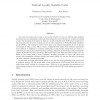Free Online Productivity Tools
i2Speak
i2Symbol
i2OCR
iTex2Img
iWeb2Print
iWeb2Shot
i2Type
iPdf2Split
iPdf2Merge
i2Bopomofo
i2Arabic
i2Style
i2Image
i2PDF
iLatex2Rtf
Sci2ools
115
click to vote
APPROX
2005
Springer
2005
Springer
Tolerant Locally Testable Codes
An error-correcting code is said to be locally testable if it has an efficient spot-checking procedure that can distinguish codewords from strings that are far from every codeword, looking at very few locations of the input in doing so. Locally testable codes (LTCs) have generated a lot of interest over the years, in large part due to their connection to Probabilistically checkable proofs (PCPs). The ability to correct errors that occur during transmission is one of the big advantages of using a code. Hence, from a coding-theoretic angle, local testing is potentially more useful if in addition to accepting codewords, it also accepts strings that are close to a codeword (in contrast, local testers can have arbitrary behavior on such strings, which potentially annuls the benefits of error-correction). This would imply that when the tester accepts, one can follow-up the testing with a (more expensive) decoding procedure to correct the errors and recover the transmitted codeword, while i...
Algorithms | APPROX 2005 | Efficient Spot-checking Procedure | Probabilistically Checkable Proofs | Testable |
Related Content
| Added | 26 Jun 2010 |
| Updated | 26 Jun 2010 |
| Type | Conference |
| Year | 2005 |
| Where | APPROX |
| Authors | Venkatesan Guruswami, Atri Rudra |
Comments (0)

